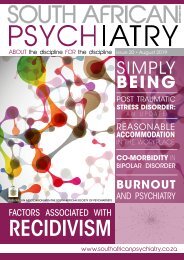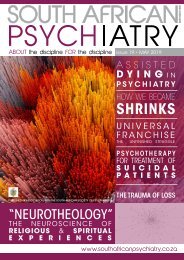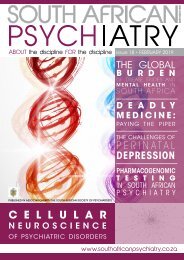South African Psychiatry - November 2020
South African Psychiatry - November 2020
South African Psychiatry - November 2020
You also want an ePaper? Increase the reach of your titles
YUMPU automatically turns print PDFs into web optimized ePapers that Google loves.
WITS JOURNAL OF CLINICAL MEDICINE – REPUBLICATION
Children with
limited access to
medical care
HEALTHCARE WORKERS
• International data 30,31 suggest
a decrease in clinic visits,
vaccinations and treatment followups,
and delays in screenings,
referrals and assessments for
various medical conditions.
Healthcare workers are employed in environments
that regularly present them with often unique and
hazardous challenges, many of which are seen
as an inherent part of work responsibilities. The
COVID-19 pandemic introduced additional work
hazards in the healthcare environment. 31 Globally,
various difficulties have been exacerbated due
to the pandemic and newer challenges have
emerged. These include the requirement for much
stricter biosecurity measures, the constant risk of
contracting the disease, increased workloads,
concerns about putting family members at risk and
the stigma faced by healthcare workers. 1 The World
Health Organisation (WHO) has acknowledged
an increased risk of anxiety amongst healthcare
workers and a possible increase in burnout and
PTSD. 32,33,34 Healthcare workers have also been faced
with significant shortages of personal protective
equipment, the lack of specific treatments,
constant media coverage and a sense of not being
supported adequately. 2 Additionally, reasons for
psychological distress include fears of contracting
the virus, passing on the virus to families, increased
patient load, and staff shortages. 35,36
One cross-sectional study of healthcare workers
in multiple hospitals in China between 29
January-03 February 2020 assessed the mental
health outcomes and associated factors among
healthcare workers who were involved in managing
COVID-19 patients. 35
IN THIS STUDY 50.4% OF PARTICIPANTS
REPORTED SYMPTOMS OF DEPRESSION,
44.6% ANXIETY, 34.0% INSOMNIA AND
71.5% DISTRESS. SYMPTOMS WERE MORE
SEVERE ACROSS ALL MEASUREMENTS
AMONG NURSES, WOMEN, FRONTLINE
WORKERS AND THOSE WORKING
IN WUHAN, THE EPICENTRE OF THE
EPIDEMIC. THERE HAVE ALSO BEEN
REPORTS OF MEDICAL PERSONNEL
SUCCUMBING TO SUICIDE DURING
THE COVID-PANDEMIC. EVEN DURING
NON-PANDEMIC CIRCUMSTANCES,
PHYSICIANS AND HEALTHCARE WORKERS
FACE ELEVATED RISKS FOR SUICIDE. 37
A significant number of healthcare workers have
been infected and succumbed to the disease
internationally. This places an added burden
on an already constrained workforce, thereby
increasing the workload and risks faced in the
workplace, particularly as the number of admitted
cases exponentially increase during peaks of the
pandemic. 38
THIS MAY CREATE A SENSE OF
POWERLESSNESS AMONG HEALTHCARE
WORKERS AND THUS INCREASE THEIR
VULNERABILITY TO ADVERSE MENTAL
HEALTH OUTCOMES. ONE OF THE MOST
IMPORTANT FACTORS THAT MAY HAVE
A DETRIMENTAL EFFECT ON MENTAL
HEALTH OUTCOMES IS THE ASSEMBLY
LINE CONDITIONS THAT MAY EXIST IN
THE HEALTHCARE SYSTEM, 3 WHICH HAVE
BECOME INCREASINGLY PREVALENT IN
THE CURRENT PANDEMIC.
The COVID-19 pandemic and the severe constraints
on resources have thrown to the fore certain serious
ethical dilemmas faced by frontline workers. 39,40 One
of the most important of these has been patients’
access to life-saving interventions such as critical
care beds and ventilation. Health care workers
often have to make decisions on who these are
allocated to. This responsibility can have negative
effects on health care workers’ mental health
outcomes. Specific interventions designed to meet
the concerns and challenges faced by health
care workers during the pandemic must include
the availability and accessibility of mental health
services to health care workers within the workplace
to enable early detection and management of
mental health issues.
CONCLUSION
This review highlights some of the possible
psychiatric sequelae resulting from infection and
experiences due to the recent COVID-19 pandemic.
In addition to the focus on anxiety among afflicted
patients, we expand the scope of COVID-19 related
psychopathological presentations and disease
trajectories that have been documented worldwide
and that may arise in South Africa. Other important
disorders such as trauma and stressor related
disorders and bereavement issues have not been
included here. The global disruption in economies,
health systems, and daily life has inevitably made
a comprehensive impact on South Africa society.
Future risks include limited allocation of funding to
state and non-governmental mental health and
social services, greater challenges to pre-existing
service delivery limitations, and threats to quality of
care.
WE CAUTION THE EXTRAPOLATION OF
CURRENT RESEARCH FINDINGS ON
COVID-19 AND ENCOURAGE A CRITICAL
APPRAISAL OF EARLY STUDIES ON THE
DISEASE.
SOUTH AFRICAN PSYCHIATRY ISSUE 25 2020 * 21
















